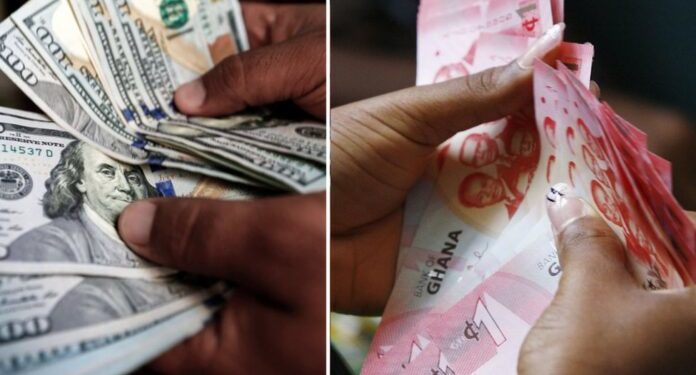In the latest release of the Bank of Ghana’s May 2023 Summary of Economic and Financial Data, the Ghanaian Cedi has come under significant pressure, recording a depreciation rate of 21.7% against the US dollar.
This marks a notable increase of 5.8% compared to the depreciation rate of 15.9% observed in May 2022.
Starting the year with a depreciation rate of 20.6%, where the Cedi was valued at GHS 10.79 to $1, the currency’s downward trajectory has continued throughout the first five months of 2023. The recent data indicates that the Cedi’s struggles extend beyond the US dollar, with depreciation observed against other major trading currencies, such as the British Pound and the Euro.
Against the Pound, the Cedi experienced a depreciation rate of 24.6% in May, resulting in an exchange rate of GHS 13.68 for £1. This decline highlights the challenges faced by Ghana’s currency and the country’s export competitiveness. The Pound’s strength and Ghana’s widening trade deficit may have contributed to this unfavorable exchange rate.
Similarly, the Cedi faced significant devaluation against the Euro, recording a depreciation rate of 23.2% in May. This placed the exchange rate at GHS 11.90 for €1, reflecting the struggles faced by the Ghanaian currency in maintaining its value against the common European currency.
These depreciation trends against major currencies indicate the broader challenges faced by Ghana’s economy, including potential inflationary pressures, external trade imbalances, and domestic economic factors. As a country heavily reliant on exports of commodities such as gold, cocoa, and oil, fluctuations in global commodity prices can significantly impact Ghana’s foreign exchange earnings and subsequently affect the value of the Cedi.
While the Bank of Ghana has implemented various measures to stabilize the currency, including foreign exchange interventions and monetary policy adjustments, the persistence of depreciation raises concerns about the effectiveness of these interventions in addressing the root causes of the Cedi’s decline.
Furthermore, the depreciation of the Cedi may have implications for inflation, import costs, and overall consumer prices in Ghana. Import-dependent sectors, such as energy and manufacturing, could face higher production costs due to increased prices of imported inputs. This could potentially lead to inflationary pressures, impacting the purchasing power of consumers and potentially affecting economic growth.
Addressing the challenges faced by the Cedi requires a comprehensive approach, encompassing both short-term stabilization measures and long-term structural reforms. Enhancing export diversification, promoting value addition in key industries, and attracting foreign direct investment are some strategies that could help reduce Ghana’s vulnerability to external shocks and stabilize the Cedi.
As Ghana aims to position itself as a regional economic powerhouse and attract investment, addressing currency depreciation and maintaining a stable exchange rate is crucial. The government, together with the central bank, must work in synergy to implement effective policies and structural reforms that can bolster confidence in the Cedi, attract foreign investment, and foster sustainable economic growth.
The Bank of Ghana’s May 2023 Summary of Economic and Financial Data reveals the challenging depreciation trends faced by the Ghanaian Cedi against major currencies. The significant depreciation against the US dollar, British Pound, and Euro highlights the need for comprehensive measures to stabilize the currency, address structural weaknesses in the economy, and foster sustainable economic growth in Ghana.
Norvareports





